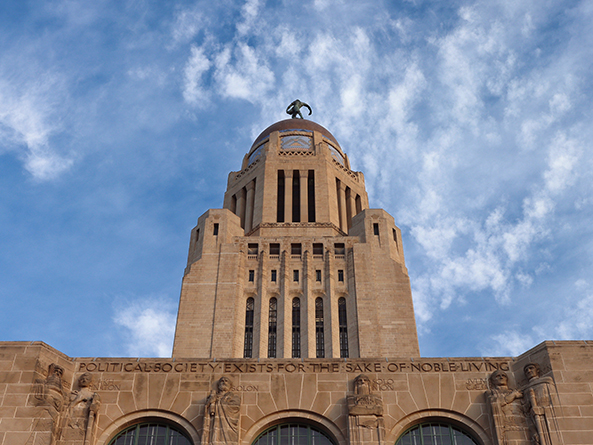Microdistillery, craft brewery expansion bill amended, advanced
A measure intended to provide greater flexibility to the state’s microdistilleries and craft breweries to grow their businesses was amended and given second-round approval March 31.

As amended on general file, LB113, introduced by Grand Island Sen. Dan Quick, would increase the amount of alcohol that a holder of a microdistillery license can self-distribute to retail licensees in Nebraska from 500 gallons to 3,500 gallons.
It also would increase the number of licensed premises and retail locations a craft brewery or microdistillery licensee is permitted to operate from five to eight physical locations.
Lincoln Sen. Jane Raybould opposed the measure and offered an unsuccessful motion to bracket the bill until the final day of the Legislative session.
She said an advisory opinion requested from the state attorney general indicated that passage of LB113 could increase the likelihood that Nebraska would face a challenge from an out-of-state distributor under the dormant Commerce Clause of the US Constitution by creating an unfair advantage for small producers who can self-distribute.
After the bracket motion failed, Raybould offered an amendment that would retain the increased number of physical locations for craft brewers and microdistillers in the bill, but would require that all alcohol sold but not produced at those locations be transported to the retail location by a licensed wholesaler.
Raybould said the amendment would allow small brewers and distillers to expand their physical locations but not at an unfair competitive advantage over other businesses.
Whitman Sen. Tanya Storer opposed the amendment, saying it would harm small businesses by eliminating their limited existing ability in state law to self-distribute. Entrepreneurship and value-added agriculture are things that lawmakers should want to promote, she said.
“I’m actually just kind of fascinated by this whole conversation — that we are looking for a variety of ways to limit the growth of entrepreneurs,” Storer said. “It blows my mind.”
The amendment failed on a vote of 1-33.
Senators also rejected an amendment from Elmwood Sen. Robert Clements that would require craft breweries and microdistilleries with more than one retail location separate from where their products are manufactured to install devices on their equipment to measure the flow of all alcohol produced.
Each licensee also would be required to submit a monthly report to the Nebraska Liquor Control Commission detailing the flow of all alcohol produced on their licensed premises.
Clements said craft brewers and microdistillers are the only alcohol producers in the state that are allowed to self-report their production for taxation purposes with no way for the LCC to verify those reports.
The amendment would apply only to brewers and distillers with more than one retail location, Clements said, so it wouldn’t be an undue burden on the state’s smallest businesses.
Quick opposed the amendment, saying Nebraska has never had compliance issues with craft brewers and microdistillers. He said requiring flow meters would be an unfunded mandate that would add to the cost of production, a cost that in turn likely would be passed on to consumers, ultimately harming small businesses.
The Clements amendment failed 10-25.
Lawmakers adopted an amendment offered by Norfolk Sen. Robert Dover to add provisions of his LB186, which would make a number of changes to existing law regarding entertainment district licenses.
The amendment would stipulate that alcohol consumption in an entertainment district commons area could occur only during the hours authorized for on-premise alcohol sales and while food service is available in the commons area or from at least one holder of an entertainment district license.
It also would create a new, separate definition of commons area for licensees in villages, first and second class cities and unincorporated portions of a county. The definition of commons area for primary and metropolitan class cities would remain unchanged.
The new definition for smaller communities would not require that an area be completely closed to vehicular traffic when used as a commons area and would allow carrying of open alcohol while crossing a street or highway at a designated crosswalk.
Dover said many of the state’s smaller communities would like to apply for entertainment district licenses, but cannot meet the same criteria as Omaha and Lincoln, such as physically blocking entire streets from vehicle traffic.
“Communities across Nebraska are looking to find ways to engage people to come to downtown areas as well as to attract and appeal to young people to stay in their communities,” he said.
The Dover amendment was adopted 35-0.
Also approved was an amendment from Bellevue Sen. Rick Holdcroft that he said would address concerns raised by the attorney general’s opinion. The amendment states that if any section or part of a section of LB113 is declared invalid or unconstitutional, the ruling would not affect the validity or constitutionality of the remaining portions.
He said the amendment would ensure that Nebraska’s three-tiered system for alcohol regulation would remain intact should such a lawsuit be filed and ultimately be successful.
Holdcroft said the bill would allow craft brewers and microdistillers to self-distribute only 3.5% of the 100,000 gallons they are allowed to produce annually under Nebraska law. Courts in other states have indicated that such a small benefit to in-state businesses is not enough to unconstitutionally disadvantage an out-of-state distributor, he said.
“We remain confident that LB113 as amended by this body will survive a theoretical constitutional challenge based on the dormant Commerce Clause and, more importantly, we are confident this bill will grow these businesses — these small businesses — across our state,” Holdcroft said.
Following the 40-1 adoption of the amendment, senators advanced LB113 to the final round of debate on a 33-2 vote.


